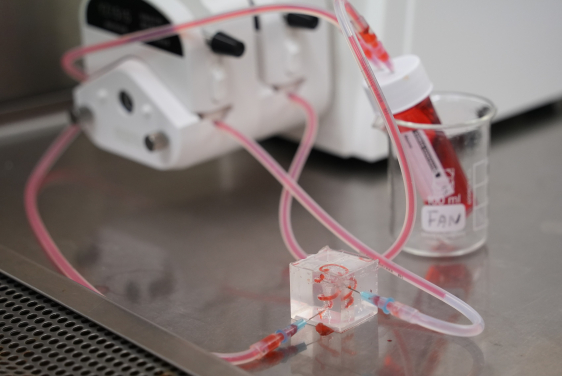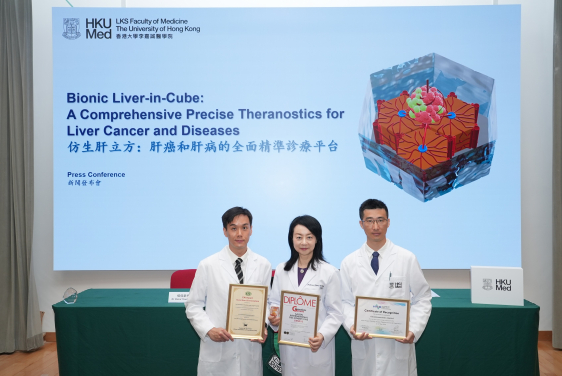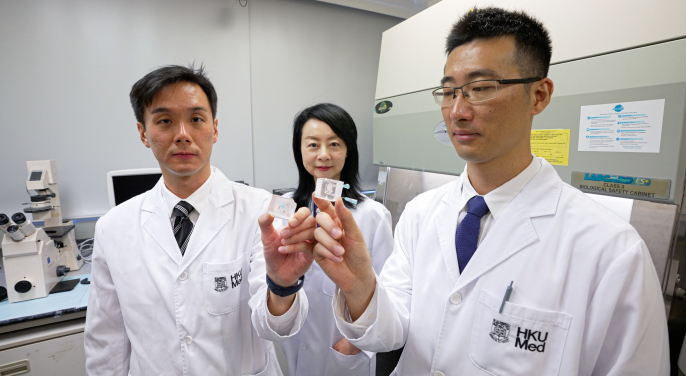Media
HKUMed’s world-first ‘Liver-in-Cube’ wins a Gold medal at International Exhibition of Inventions of Geneva, advancing precise cancer treatment
11 Jun 2024

The new drug screening platform ‘Liver-in-Cube’ is developed using cells and tissue from liver cancer patients. The platform accurately simulates the tumour characteristics of individual patients, allowing continuous drug tests and evaluation of the effects of various therapies on the bench.

HKUMed’s world-first ‘Liver-in-Cube’ helps rapid evaluation of the efficacy and side effects of various drugs and therapies, advancing precise cancer treatment. (From left) Dr Oscar Yeung Wai-ho, Professor Man Kwan and Dr Liu Jiang.

HKUMed’s world-first ‘Liver-in-Cube’ helps rapid evaluation of the efficacy and side effects of various drugs and therapies, advancing precise cancer treatment. (From left) Dr Oscar Yeung Wai-ho, Professor Man Kwan and Dr Liu Jiang.
- 1 / 3
- 2 / 3
- 3 / 3
A research team from the LKS Faculty of Medicine at the University of Hong Kong (HKUMed) has developed ‘Bionic Liver-in-Cube: A Comprehensive Precise Theranostics for Liver Cancer and Diseases’ (‘Liver-in-Cube’). Using 3D bioprinting, it can mimic the liver tumour of patients for rapid evaluation of the efficacy and side effects of various traditional drugs and emerging therapies, helping doctors make accurate diagnosis and treatment decisions. The innovative invention was awarded a ‘Gold Medal’ and won the special grand prize ‘Prize of the China Invention Association’ at the International Exhibition of Inventions of Geneva earlier this year.
Background
Liver cancer is the sixth most common cancer and third leading cause of cancer death globally. According to Hong Kong Cancer Registry data, there are approximately 1,800 new cases of liver cancer each year, with over 1,500 deaths, over 80% of which are advanced cases at first diagnosis. Patients with advanced liver cancer who are not suitable for surgical operations have limited treatment options. Traditional chemotherapy, targeted therapy and immunotherapy for treating advanced liver cancer often have a low response rate and severe side effects, thereby limiting their efficacy and hindering the patient’s quality of life.
Patients with different tumours and immune microenvironments respond differently in terms of drug efficacy, side effects and drug resistance, resulting in unpredictable treatment outcomes among patients, even with the same drug. Owing to the lack of precise drug-screening strategies, liver cancer patients often undergo multiple treatment failures in the search for the most suitable drug. This results in unnecessary financial burden on patients and failure to catch the golden time in killing the tumour cells effectively and the chance to prolong survival and improve the quality of life.
Research findings and significance
To develop precision medicine for liver cancer, the research team invented three core technologies. First, it uses novel technology in cells and matrix protein separation by simultaneously extracting hepatocytes, tumour cells, immune cells and matrix proteins from the tissue of the liver cancer patient. The invention also accurately simulates the tumour characteristics of individual patients, such as the number of cells, tissue stiffness, immune status and other key factors, to tailor-make and customise a high-standard, biomimetic and personalised drug-screening platform. Second, utilising advanced 3D bioprinting technology, a novel model with regions containing normal tissue, tumour tissue and vascular structure is fabricated. Compared to traditional 3D cell culture and organoid products, the invention is more biomimetic and capable of reproducing the patient’s tumour architecture and characteristics. Third, the innovative tumour model is equipped with a unique microvascular system, allowing the product to continuously undergo drug tests and to evaluate the effects of various therapies on the bench.
Professor Man Kwan, Chair Professor in the Department of Surgery, School of Clinical Medicine, HKUMed, who led the research project, pointed out that there is currently a lack of personalised drug-screening products and services related to malignancies, especially liver cancer, in the market. The new drug screening platform ‘Liver-in-Cube’ accelerates the evaluation of the efficacy and side effects of various drugs for patients, allowing doctors to identify the optimal treatment method for personalised treatment. The invention allows patients to quickly receive the most effective and individualised treatment with the least adverse effects and reduced recurrence, thus leading to prolonged survival and improved quality of life.
Professor Man believes that the invention has broad application prospects and can be extended to other cancers and liver diseases. ‘For clinical applications in personalised drug screening, the invention provides speedy and precise treatment options in the best interests of patients. It can significantly improve the quality of life of patients by promoting early diagnosis and treatment of liver cancer and liver disease, and accelerating the promotion and application of precision medicine for various diseases,’ stated Professor Man.
‘Liver-in-Cube’ accurately simulates diseases in patients and can also be widely used in new drug development as a substitute for animal models. It provides preclinical efficacy and safety testing for new drugs with more accurate data, thus increasing the success rate of further clinical trials. The product can shorten the new drug development cycle and reduce costs. In terms of basic research, the invention can replicate the liver cancer and liver disease microenvironment in multiple dimensions, which can help researchers deeply explore the regulatory mechanisms of the disease’s immune microenvironment, and help accelerate the discovery of new targets and the development of new treatments.
At present, ‘Liver-in-Cube’ is undergoing preclinical study, clinical efficacy research and safety assessment. The research team aims to leverage the scientific data to facilitate the commercialisation of the technology and make it available in both local and overseas markets, thus benefitting a wide range of patients. The invention has the potential to promote industry upgrading in the fields of medical health, pharmaceuticals and basic research, strengthening Hong Kong’s position as an international innovation hub for life and health technologies.
About the research team
The award-winning research was jointly led by Professor Man Kwan, Chair Professor, Department of Surgery, School of Clinical Medicine, HKUMed; and Professor Lu Jian, City University of Hong Kong. The research team members included Professor Albert Chan Chi-yan, Clinical Professor; Dr Liu Jiang, Research Assistant Professor, and Dr Oscar Yeung Wai-ho, Postdoctoral Fellow, in the Department of Surgery, School of Clinical Medicine, HKUMed.
Media enquiries
Please contact LKS Faculty of Medicine of The University of Hong Kong by email (medmedia@hku.hk).
